

149 New Montgomery Street, 3rd Floor San Francisco, CA 94105 USA. Paul Rabinow. Paul Rabinow (born June 21, 1944) is Professor of Anthropology at the University of California (Berkeley), Director of the Anthropology of the Contemporary Research Collaboratory (ARC), and former Director of Human Practices for the Synthetic Biology Engineering Research Center (SynBERC).
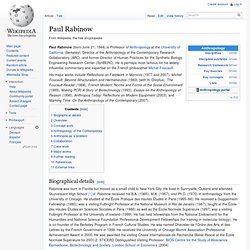
He is perhaps most famous for his widely influential commentary and expertise on the French philosopher Michel Foucault. His major works include Reflections on Fieldwork in Morocco (1977 and 2007), Michel Foucault: Beyond Structuralism and Hermeneutics (1983) (with H. Dreyfus), The Foucault Reader (1984), French Modern: Norms and Forms of the Social Environment (1989), Making PCR: A Story of Biotechnology (1993), Essays on the Anthropology of Reason (1996), Anthropos Today: Reflections on Modern Equipment (2003), and Marking Time: On the Anthropology of the Contemporary (2007). Biographical details[edit] Rabinow was born in Florida but moved as a small child to New York City. Overview[edit] Anthropology Department, UC Berkeley. 2011.
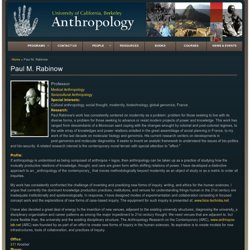
The Accompaniment: Assembling the Contemporary, University of Chicago Press. 2008. Designs for an Anthropology of the Contemporary, with G. Marcus, Duke University Press. 2007. 2007. 2007. 2005. 2005. 2004. 2003. 2003. Herbert Boyer. Herbert W.
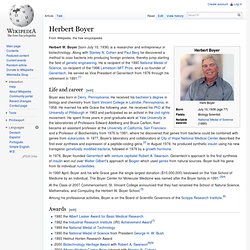
Boyer (born July 10, 1936) is a researcher and entrepreneur in biotechnology. Along with Stanley N. Cohen and Paul Berg he discovered a method to coax bacteria into producing foreign proteins, thereby jump starting the field of genetic engineering. He is recipient of the 1990 National Medal of Science, co-recipient of the 1996 Lemelson–MIT Prize, and a co-founder of Genentech.
He served as Vice President of Genentech from 1976 through his retirement in 1991.[1] Life and career[edit] Law - Berkeley Law - Faculty Profiles. General • courses • teaching evaluations • cv • publications.
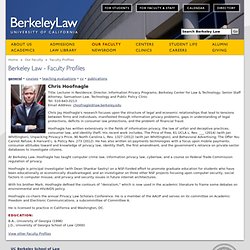
Network societies - Google-søgning. Manuel Castells. Manuel Castells Manuel Castells is University Professor and the Wallis Annenberg Chair in Communication Technology and Society at the University of Southern California (USC), Los Angeles.
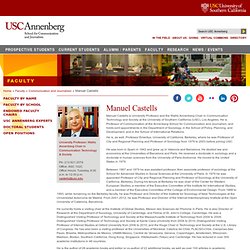
Clifford Nass. Clifford Nass is the Thomas M.
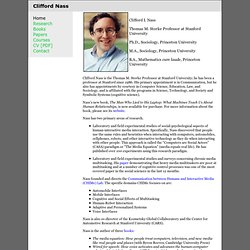
Storke Professor at Stanford University; he has been a professor at Stanford since 1986. His primary appointment is in Communication, but he also has appointments by courtesy in Computer Science, Education, Law, and Sociology, and is affiliated with the programs in Science, Technology, and Society and Symbolic Systems (cognitive science). Nass's new book, The Man Who Lied to His Laptop: What Machines Teach Us About Human Relationships, is now available for purchase. For more information about the book, please see its website. Brain Research Institute. Karim R. Lakhani. Lumry Family Associate Professor of Business Administration Karim R.
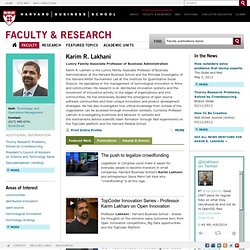
Lakhani is the Lumry Family Associate Professor of Business Administration at the Harvard Business School and the Principal Investigator of the Harvard-NASA Tournament Lab at the Institute for Quantitative Social Science. Contacts. Michael Nielsen on Networked Science. Christian Waldstrøm om Netværk. Hubert Dreyfus. Phil7-s12-Syllabus. Spring 2012Philosophy 7 Existentialism in Literature and FilmTues/Thurs 3:30 - 5:00159 Mulford Office Hours: Wednesdays 2:00 to 4:00 - 310 Moses HallSchedule Reading Requirements Lectures, Handouts and Paper Topics Reading Assignments In the traditional Judeo/Christian understanding, God is the ground of all meaning.
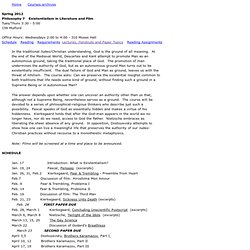
At the end of the Medieval World, Descartes and Kant attempt to promote Man as an autonomous ground, taking the traditional place of God. The promotion of man undermines the authority of God, but as an autonomous ground Man turns out to be existentially insufficient. The dual failure of God and Man as ground, leaves us with the threat of nihilism. The answer depends upon whether one can uncover an authority other than us that, although not a Supreme Being, nevertheless serves as a ground. Note: Films will be screened at a time and place to be announced. Hubert Dreyfus. Hubert Lederer Dreyfus (born October 15, 1929) is an American philosopher and professor of philosophy at the University of California, Berkeley.
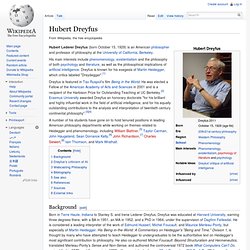
Dreyfus is featured in Tao Ruspoli's film Being in the World. Lektor Christian Waldstrøm. Open Science Summit. The Open Science Summit unites researchers, life science industry professionals, students, patients and other stakeholders to discuss the future of collaborative science and innovation.
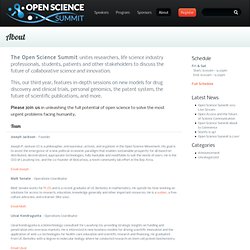
This, our third year, features in-depth sessions on new models for drug discovery and clinical trials, personal genomics, the patent system, the future of scientific publications, and more. Please join us in unleashing the full potential of open science to solve the most urgent problems facing humanity. Team Joseph Jackson – Founder Joseph P. Email Joseph Matt Senate – Operations Coordinator. Howard Rheingold. Howard Rheingold (born July 7, 1947) is a critic, writer, and teacher; his specialties are on the cultural, social and political implications of modern communication media such as the Internet, mobile telephony and virtual communities (a term he is credited with inventing).
Biography[edit] Rheingold was born in Phoenix, Arizona. He attended Reed College in Portland, Oregon, from 1964 to 1968. His senior thesis was entitled "What Life Can Compare with This? Sitting Alone at the Window, I Watch the Flowers Bloom, the Leaves Fall, the Seasons Come and Go. You're Invited! Howard Rheingold's Peeragogy Project Welcomes Co-Learners. Howard Rheingold, legendary author of Smart Mobs and the forthcoming NetSmart (MIT Press, March 2012) doesn't "teach" at Stanford and Berkeley.
He "colearns" and not just with students there but with anyone who wants to participate. And that means us. He has extended an open invitation to be part of his "Peeragogy Project. " What he is up to this semester is a collaborative, open peeragogy handbook--a wiki-based collaborative project where anyone who joins in can contribute bibliography, ideas, examples, and other content to an open resource to guide others in the fine art of peer-to-peer teaching. As Howard notes: "In preparation for this project, I've asked a talented student to put together a peeragogy literature review, based on my unorganized collection of links about paragogy. I love that. Geoffrey C. Bowker.